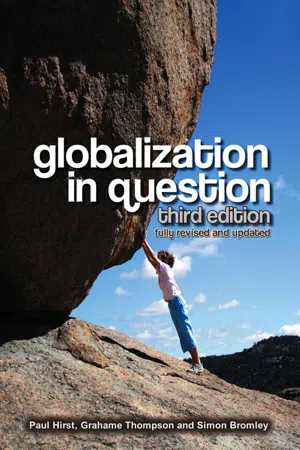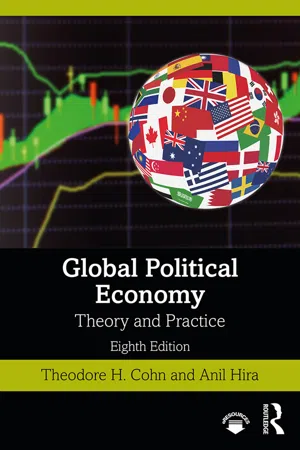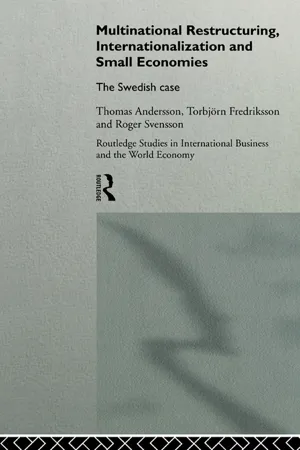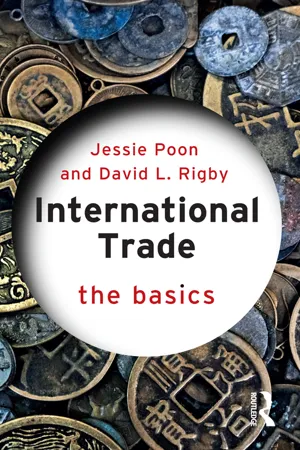Economics
International Companies
International companies are businesses that operate in multiple countries, engaging in cross-border trade, investment, and production. These companies often have a global presence, with subsidiaries, branches, or operations in various countries. They play a significant role in the global economy, contributing to international trade, technology transfer, and the movement of capital and resources across borders.
Written by Perlego with AI-assistance
Related key terms
5 Key excerpts on "International Companies"
- eBook - ePub
New Orientations
Essays in International Relations
- Edith Tilton Penrose(Author)
- 2013(Publication Date)
- Routledge(Publisher)
organisations, in the sense that the activities of the international group are carried on within an overall administrative framework and subject to overall policies laid down by their central administrative units.A large firm necessarily possesses considerable economic power even if it does not have a strong monopolistic market position: by definition it controls a large amount of resources the use of which is decided by its management; it commands a large market over which it can exercise various kinds of influence; it raises and spends very large sums of money; it is a large buyer and a large employer. This implies possession of economic power, for economic power in its widest sense consists of the ability significantly to influence the use of resources, the distribution of goods, the prices of products, the tastes of the consumers, the development of new technology, and the distribution of income.These international organisations are primarily interested in their own profitability and continued growth, and left to themselves will be concerned with political matters only to the extent that government policies or political conditions affect their economic operations. In principle, they, like other firms, have only economic, that is to say ‘commercial’, objectives, but since the political attitudes as well as the political conditions in a country may be of decisive importance for economic operations, an international firm may be unavoidably drawn into political affairs in a number of countries. - eBook - ePub
- Paul Hirst, Grahame Thompson, Simon Bromley(Authors)
- 2015(Publication Date)
- Polity(Publisher)
3Multinational Companies and the Internationalization of Business Activity
This chapter moves away from the history of the international trading and financial system. It concentrates on the major changes in the structure of the international economy since the early 1980s, particularly in terms of the internationalization of production. One of the key changes identified and explored here is the increased salience of, and rapid growth in, foreign direct investment (FDI). In the period 1945–73 the dominant factor driving the world economy was growth in international trade; from the early 1980s onwards, it is argued, it has been growth in FDI. It should be noted, however, that in this chapter we develop a critique of this particular measure of the internationalization of production. A more recent associated consequence of this internationalization of production has been the phenomenon of ‘offshoring’: the move of aspects of company production and service systems away from their traditional ‘home’ country base to foreign destinations. This phenomenon is considered in a later section.This chapter concentrates on those international mechanisms that have an impact on the structure of and growth in the real economy: trade and FDI. International short-term financial flows, which expanded rapidly after the abandonment of semi-fixed exchange rates and capital controls in the 1970s, are analysed elsewhere (chapters 2, 6 and 7). Clearly, these short-term capital flows have some indirect impact on economic growth since they affect national exchange rates and interest rates, but we contend that they mainly redistribute success – and more often failure – around the international system, and add little to the structural capacity of economies to generate long-term aggregate growth.It is multinational companies (MNCs) that are the agents responsible for FDI. The strategies of these organizations as they shape the role and distribution of FDI are central to the analysis that follows. As we shall see, that distribution is socially and geographically uneven on a world scale. FDI is heavily concentrated in the advanced industrial states and in a small number of rapidly developing industrial economies. This analysis is complemented later in the chapter by a detailed empirical investigation into the geographical distribution of advanced country business activity, contrasting its home and foreign concentrations. - eBook - ePub
Global Political Economy
Theory and Practice
- Theodore H. Cohn, Anil Hira(Authors)
- 2020(Publication Date)
- Routledge(Publisher)
Chapter10Multinational Corporations and Global Production
T he largest multinational corporations (MNCs) are in many respects the main agents of globalization. They produce and distribute goods and services across national borders; plan their operations on a global scale; and spread ideas, tastes, and technology throughout the world. MNCs are firms that own assets and conduct business activities in more than one country. MNC parent firms in home countries acquire foreign assets by investing in affiliate or subsidiary firms in host countries. Foreign direct investment (FDI) involves management rights and control of assets abroad, what is commonly referred to as “plant, property and equipment.” Portfolio investment , by contrast, is investment without control; it involves the purchase of bonds, money market instruments, or stocks simply to realize a financial return. The growing importance of FDI testifies to the role of MNCs as agents of globalization. FDI flows , or the value of FDI in a single year, have generally increased, but sometimes they decline because of international events. For example, global FDI inflows declined from $1.47 trillion in 2013 to $1.23 trillion in 2014 because investors reacted cautiously to a fragile global economy and increased geopolitical risks. FDI stock refers to the net accumulated value of FDI resulting from past flows. In 2014, for example, global inward FDI stock was valued at $26.0 trillion. Foreign affiliates of MNCs employed about 75 million people in 2014, and more than one-third of world trade occurs as intrafirm trade (international trade between a parent firm and its affiliates). International production is also fairly concentrated. Although the world’s 100 largest MNCs represent only about 0.13 percent of the total number of MNCs, in 2011 they accounted for 9.3 percent of the foreign assets, 21 percent of the foreign sales, and 14.4 percent of the employment of all MNCs. However, smaller companies are finding it easier to become MNCs because of advances in information and communication technologies.1 - Thomas Andersson, Torbjorn Fredriksson, Roger Svensson(Authors)
- 2005(Publication Date)
- Routledge(Publisher)
2 MULTINATIONAL COMPANIES AND NATION STATES BASIC THEORIESAlong with households, firms are the main actors in the market place, and economic analysis has generally treated them as atomistic and anonymous. Of course, it has long been acknowledged that individual firms, owing to transaction costs and other market imperfections, may grow large and complex with the exploitation of economies of scale and scope. Still, economics has generally continued to judge them on the basis of their external market behaviour.This approach has been fundamentally challenged by the rise of the MNC, which gains control of equity in foreign markets primarily through FDI. In recent decades, FDI has expanded more rapidly than world income or the total trade in goods. While income and trade almost doubled in value, the stock of FDI quadrupled to an amount corresponding to some 8 per cent of world income (Jungnickel, 1993). Meanwhile, the number of MNCs in the world has increased from 7,000 in the late 1960s to some 37,000 in the early 1990s. It is estimated that these firms control 200,000 affiliates, not counting non-equity links, and that the total sales of foreign affiliates exceed the value of all international trade by some 40 per cent (UNCTAD, 1994).FDI originally targeted developing countries, and was viewed as a supplement to portfolio investment and inter-industry trade between economies which are inherently dissimilar in terms of comparative advantage. Accordingly, FDI used to be perceived as motivated by differences between countries in the marginal return to capital, in the same way as portfolio investment. The result was a set of macrooriented theories, based on international trade, e.g. the currency premium theory (Aliber, 1970), the dynamic comparative advantage theory (Kojima, 1973), and the level-of-development theory (Dunning, 1981).- eBook - ePub
International Trade
The Basics
- Jessie Poon, David L. Rigby(Authors)
- 2017(Publication Date)
- Routledge(Publisher)
These global value or supply chains are typically managed by transnational corporations (TNCs) that move goods and services across international borders within the networks of affiliates, sub-contractors and independent suppliers that they control. It is estimated that up to 80% of all global trade is undertaken by transnational corporations moving inputs and outputs along their global value chains (UNCTAD, 2013a). The aim of this chapter is to explore the rise of TNCs, to gain a better understanding of their operations and significance within the world economy, especially their role in orchestrating trade. We begin this task in the next section examining the emergence of TNCs and the reasons for their growth. We explore why firms internationalize and how TNCs organize their operations. The chapter moves ahead to show just how significant TNC activities are within the world economy, briefly presenting statistics on the growth of TNCs and foreign direct investment (FDI). The structure of the global production networks (GPNs) managed by TNCs is then discussed before analysis of the contribution of TNCs to world trade flows. A brief summary ends the chapter. Origins of TNCs and Why Firms Internationalize In the capitalist market system commodity production is undertaken for exchange driven by the pursuit of profit. No firm is guaranteed profit because of the vagaries of the market. A few firms attempt to manage this uncertainty by controlling markets. For most, however, competition means that they can only control the manner in which inputs are transformed into outputs, seeking advantage by increasing the efficiency of production. In this competitive environment firms are compelled to innovate, to search for new products and develop new markets, to experiment in new locations, with new sources of inputs, new processes of production and organizational routines, sure only in the knowledge that others are doing the same
Index pages curate the most relevant extracts from our library of academic textbooks. They’ve been created using an in-house natural language model (NLM), each adding context and meaning to key research topics.




